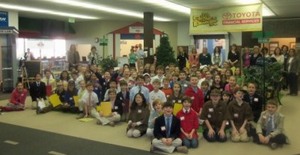Math and Money in the Real World
By Kelly Medinger
11-16-2012
Junior Achievement of Central Maryland uses education grant to build financial literacy among Catholic school students
 How many young people can calculate the value of a stock portfolio or define the difference between gross and net income? Nine in ten Catholic school seventh and eighth graders could, after participating in Junior Achievement of Central Maryland’s Finance Park program.
How many young people can calculate the value of a stock portfolio or define the difference between gross and net income? Nine in ten Catholic school seventh and eighth graders could, after participating in Junior Achievement of Central Maryland’s Finance Park program.
Making Smart Academic and Economic Choices
“At Junior Achievement, we give young people the knowledge and skills they need to own their economic success, plan for their future, and make smart academic and economic choices,” remarks Jennifer Bodensiek, President of Junior Achievement of Central Maryland (JA). JA’s programs are designed to deliver hands-on experiences that give young people the knowledge and skills in financial literacy, work readiness and entrepreneurship.
“JA helps students by supplying a real-world perspective that complements classroom learning,” Bodensiek says. “This approach is especially important given so many young people drop out or perform poorly in school because of boredom. This sense of boredom often stems from a disconnect between the classroom and the skills they perceive needing in the real world. The goal of JA programs and our cadre of trained corporate and community volunteers is to share life lessons to make learning come to life and be that connector between the classroom and the real world,” she adds.
Connecting with Young People
When it comes to connecting with more young people, JA has had great success. The organization currently serves 33,000 students annually in 12 Maryland counties, a 64% increase from the previous year. Over the last 15 years, the Knott Foundation has invested nearly $100,000 to support JA’s work in Catholic schools in particular. Most recently, a grant enabled more than 3,000 middle grade students and 800 elementary students to participate in JA’s two capstone programs, JA BizTown and JA Finance Park Virtual.
JA BizTown is an interactive experience where students visit a simulated town, work at assigned jobs, receive paychecks, buy and sell goods and services, and manage their business and personal finances. When students are older, they participate in JA Finance Park Virtual – a computer simulation where a student receives a unique profile (such as a married woman with two children making $40,000/year) and then plays the game of life, budgeting and investing her own money as various situations arise.
Taking the Program System-Wide in the Archdiocese
Notably, the Foundation’s grant was a key ingredient to helping take the JA Finance Park Virtual program system-wide in the Archdiocese of Baltimore. The program is now taught to all seventh grade math students throughout the Archdiocesan school system. Students’ reactions have been positive. A recent graduate of St. Stephens School in Kingsville who took part in JA Finance Park Virtual even told her former teacher, “Keep doing Finance Park because it has already helped me in high school!”
